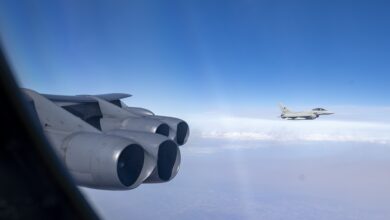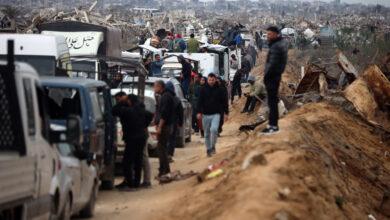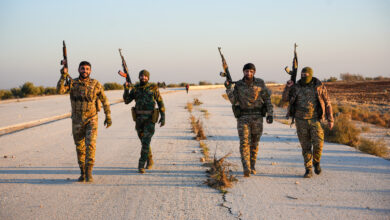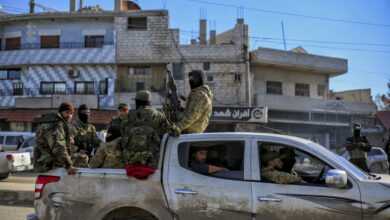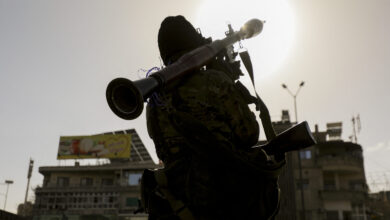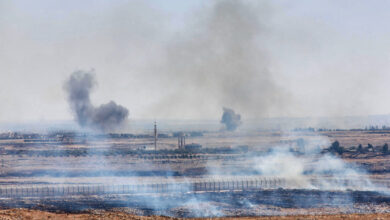Alleged Italian ISIS member captured in Syria may match known foreign fighter profile
Samir Bougana said he was captured in August near Raqqa while trying to cross into Turkey with his wife and daughters
Kurdish fighters in northern Syria detained an alleged Italian member of Islamic State as he was trying to flee across the border to Turkey.
On August 27, “a mercenary called Semir Bogana … was captured as a result of a special operation conducted by our Anti-Terror Units (YAT), when he was trying to flee to Turkey,” the People’s Protection Units (YPG) said in a Thursday, September 13 statement.
It said the man – an Italian citizen known also as Abu Hureyre al-Muhajir or Abu Abdullah al-Muhajir – was responsible for weapons shipments to ISIS and “has been in charge of the activities of the ISIS foreign fighters” in the majority-Kurdish areas of northern Syria, Rojava. The adopted name al-Muhajir means “the emigrant.”
“Many details about the ISIS terrorist organization and its external relations have been revealed by this captured mercenary,” the statement added.
In a video published later by the YPG which gave his name as “Samir Bougana,” the captured fighter said in Italian that he was a member of ISIS and that his nom-de-guerre was Abu Abdullah.
He said that he was in Syria for “two or three years,” and that he intended to cross the border into Turkey with his wife and daughters to seek help from the Italian consulate return to Italy, but he was captured near Raqqa.
It was not immediately possible to confirm that Bougana is an Italian citizen, nor whether his wife and daughters are in the custody of the Syrian Democratic Forces.
The YPG makes up the bulk of the Syrian Democratic Forces, the U.S.-led Coalition-backed alliance of Kurds, Arabs and Christians that spearheaded the fight against ISIS.
The detained Italian was currently being interrogated and “his fate will be determined at the end of the investigation,” AFP reported an SDF source as saying.
“We are coordinating with the international coalition, which includes Italy, about all the Daesh detainees,” he added, using an Arabic acronym for ISIS.
Possible match in Italian foreign fighters dataset
Silvia Carenzi, a researcher of militant Islamism at the Italian Institute for International Political Studies (ISPI)’s Center on Radicalization and International Terrorism, told The Defense Post that the Center is probing whether Bougana is a match for any profile in its exclusive data provided by Italian authorities in 2017.
Carenzi said that if Bougana were confirmed to be an Italian national, he would be the first Italian citizen arrested in Syria among foreign fighters within the the Center’s dataset.
“However, beyond Italian citizenship, it ought to be noted that other foreign fighters with ties to Italy were arrested abroad in the past years,” Carenzi said.
In a commentary published Friday, Dr. Lorenzo Vidino, head of the Center, and research fellow Dr. Francesco Marone said there may be a match between Bougana and one of the profiles in the dataset.
Vidinio and Marone wrote in Italian that the profile is that of a man of Moroccan origin, who was born in 1994 in the province of Brescia, northern Italy. He moved to Germany in 2010, and obtained Italian citizenship in 2012. His process of radicalization apparently began in Germany, they said, noting that he had not been part of extremism in Italy or had contact with other foreign fighters. In November 2013, he traveled to Syria to join ISIS – before he was 20 years old. To their knowledge, that man does not have a criminal background.
According to the Center’s study, at least 111 of 125 foreign fighters with links to Italy have traveled to Syria. Another three traveled to Iraq, while a further seven went to Libya. The vast majority traveled between 2013 and 2015.
Only 24 of the 125 were Italian citizens; the majority were first generation immigrants born in other countries. More than 90 percent of those who traveled were men.
At least 76 joined ISIS, while 18 joined Jabhat al-Nusra/Hayat Tahrir al-Sham, five joined the Free Syrian Army, and 31 joined other groups, although some individuals had multiple affiliations.
As of April 2018, at least 12 individuals had returned to Italy.
In November 2016, Tunisian national Moez Fezzani, who had lived in Italy, was apprehended in Sudan by Tunisian authorities. Slovenian citizen “R.Z.” who lived in northern Italy for a brief period joined ISIS in Syria, and was later arrested in Slovenia in May 2016 and extradited to Italy in June 2017.
“Another interesting case is that of Meriem Rehaily – a young Moroccan woman who in 2015 left Italy to travel to Syria, and is currently being held in a Kurdish refugee camp in northeast Syria,” Carenzi said.
The travelers from other countries
At its peak, ISIS attracted thousands of foreign fighters to Syria and Iraq, but it has since lost almost all of its territory, including its de facto capital in Syria, the northern city Raqqa.
Since then, Coalition-backed forces have been detaining foreign ISIS members in both Syria and Iraq.
According to the YPG general command, between December 2017 and January 2018, ISIS foreign fighters from Tunisia, Jordan, Saudi Arabia, Turkey, Albania, Germany, Sweden, France, the United Kingdom and other European countries were arrested while trying to escape to Turkey from territory controlled by the SDF in northern and eastern Syria.
Some countries are unwilling to accept extradited nationals who fought with ISIS in Syria. The legality of any extradition process is itself unclear because they are held by the SDF, a non-state actor.

In July, two Americans accused of supporting ISIS in Syria were transferred to the United States.
Samantha Elhassani, an American woman who traveled to Syria with her husband and children to live in ISIS-held territory, was charged with making false statements to the FBI. Elhassani says she was tricked, captured and tortured by ISIS in an interview with PBS Frontline earlier this year.
The other U.S. citizen, Ibraheem Musaibli, was charged with providing material support to ISIS. He was reportedly captured earlier this year by the SDF when he tried to escape the Middle Euphrates River Valley, one of the last ISIS strongholds.
Among the SDF’s most infamous detainees are Alexanda Amon Kotey and El Shafee Elsheikh, two members of a four-man ISIS unit dubbed “The Beatles” who are accused of taking part in notorious ISIS executions of foreign captives – including U.S. and U.K. journalists and aid workers James Foley, Stephen Sotloff, Peter Kassig, Alan Henning and David Haines.
The two British men could also be bound for the U.S. after it was revealed that the U.K. government is willing to forego its usual demand that its citizens not be subject to the death penalty. According to The Telegraph, Home Secretary Sajid Javid believes a successful terrorism prosecution is more likely in the U.S.
It’s unclear whether the two, whose U.K. citizenship has apparently been revoked, would be charged in federal courts or transferred to the U.S. military detention center in Guantanamo Bay, Cuba, but permitting their transfer to U.S. custody might allow the U.K. government to avoid possible legal challenges to the stripping of their citizenship or unlawful rendition.
John Doe, a dual U.S.-Saudi citizen suspected of fighting with ISIS, was set to be released from SDF detention in Syria in April after a federal judge ruled that the U.S. military could not hand him over to a third country – believed to be Saudi Arabia – against his will.

A number of French ISIS members have also been arrested since Raqqa’s capture.
In December 2017, the SDF arrested three French foreign fighters including Thomas Barnouin, one of the country’s most wanted jihadists, who calls himself Abu Mohamed al-Fransi. Barnouin claimed ISIS fighters in Syria aim to reach Europe through Turkey.
The same month saw the capture by the SDF of Emilie König, a 33-year-old daughter of a French police officer. In a video released by the YPG, König disputed her mother’s claim that she had been interrogated and tortured while in custody and she appealed to be returned to France, but French officials indicated they will not repatriate her.
In January, the French wives and children of ISIS fighters captured in Syria sued the government for refusing to repatriate them. The French government has said that men and women detained in Kurdish-held areas of Syria should be held there if they can be guaranteed a fair trial. Syrian Kurdish forces have captured around 40 French men and women accompanied by some 20 children who were living in ISIS-held areas.
In May, a French national allegedly involved in attacks in France, Adrien Guihal, was arrested by an SDF special unit in Deir Ezzor province.
On August 7, Macedonia’s interior ministry said police had arrested seven Macedonians accused of joining Islamic State in Iraq and Syria. Officials estimate that at least 100 Macedonians left to fight in Iraq and Syria, and about 20 have been killed on the battlefield.
Lebanese members of ISIS have also been transferred to Beirut, and a number of Russian wives and children of ISIS fighters have said to be sent home. The Russian foreign ministry has not replied to requests for comment.
Passport to jihad: European foreign fighters joining ISIS in the Philippines
With reporting from AFP



